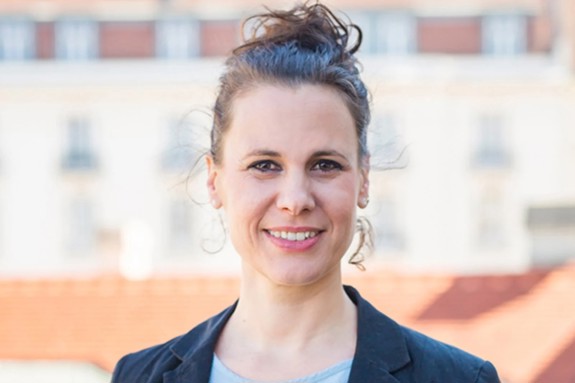From the stage into the heart of the Red Cross
Claire Schocher-Döring, Head of Tracing Services at the Austrian Red Cross used to be an actress. Gifted with an openness towards other people, a great love for details and a talent for observation, she felt at ease with different characters. Working for the Red Cross, she discovered the wealth of these qualities in her daily work at Tracing Services.

During the Balkan crisis in the 1990’s, Claire Schocher-Döring became a Red Cross volunteer. The fate of thousands of families who were looking for missing loved ones awakened a strong passion: “I felt so helpless with the consequences of the ambiguous losses the families experienced and I really wanted to make a small contribution to help make their suffering more bearable.”
”I always wonder what it must feel like when you read your loved one's writing again after years of no contact”
As head of Tracing Services of the Austrian RC, she is now able to follow her dream. Together with her team, she explores, finds out and follows even the faintest hint to be able to bring families together again. “I love to exchange postcards with my family and I always wonder what it must feel like when you read your loved one's writing again after years of no contact.”
Tracing lost family members is one of the core services of the Red Cross. Claire was at the forefront in transferring this traditional work into the digital era. Being one of the funding members of the Trace the Face project, the former youth representative helped to develop the idea for the online-platform that revolutionized the search for missing family members in Europe.
“The idea was born during a meeting of Tracing Services of Central Europe in Serbia in 2012”, Claire remembers. “We had all been working on the case of a family who was looking for their young son. The family links network was not successful but eventually another organization found the boy because they went through all refugee camps in Hungary showing a picture of the child.”
Searching with pictures seemed to be the clue. “But there were also concerns about data protection and the security of the child. So how could we combine our Red Cross principle to do no harm with the successful method of showing pictures?” The solution lay in a different perspective – like very often in life: “Instead of the missing person we decided to show a picture of the searching family members.”
It did not take long until the group could put their idea to a test. “We started with a poster displaying five persons in 2013. It was a big success. Now Trace the Face is an online platform with over 5000 entries working globally”, the energetic mother of two resumes. 14.053 requests on the platform led to the re-union of 58 families alone in 2018.
”Being mothers ourselves inspired us and made us courageous”
Interestingly the driving forces behind Trace the Face have been mostly female. “Being mothers ourselves inspired us and made us courageous”, Claire says. “To be forcibly separated from a child, not to know where he or she is, is one of the worst things I could imagine. I think Trace the Face is the best example of how important it is to listen to what people really need, to connect those needs with our experience and to be courageous enough to make mistakes and be open for new ideas.”
The female brains behind Trace the Face still see their work as a project in progress. “We have bridged the gap between the traditional tracing services dating back to WWII and digitalisation. I wonder what we will be able to achieve with new technologies like facial recognition.”
Despite digitalisation and new technologies, the tracing services will always remain a very emotional and deeply humane field of work. “Since my early days as a youth representative at the Red Cross, I have always been attracted by our worldwide network that is able to change life to so many people. In the tracing services, we never give up searching. With every case there is fate. Every family deserves to know where their loved ones are. For every family a missing member is the universe.”
Claire Schocher-Döring
Austrian Red Cross
